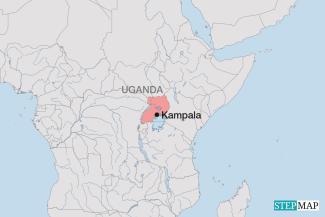Fossil fuels
Climate action and human-rights concerns fuel Uganda’s oil pipeline debate

Groups of student climate activists under the #StopEACOP movement have staged protests in recent years against the construction of the East African Crude Oil Pipeline (EACOP) in Uganda. Holding placards demanding environmental and community protection, they chanted slogans aimed at policymakers.
The Ugandan police insisting that such protests are illegal, swiftly arrested the demonstrators and confiscated their placards. Government officials dismissed the ongoing protests as “funded” efforts by foreign economic saboteurs who intend to undermine Uganda’s path to economic development.
“I have seen these young students coming to the streets every now and then to protest the EACOP pipeline. I hadn’t paid much attention to their cause, but our government claims they’re funded by foreign agents,” says Newton Balenzi, an environmentalist in Kampala. “Like them or not, these protests are sparking much-needed debate on climate action, especially regarding major projects like EACOP and Uganda’s petroleum developments.”
Debate over Uganda’s petroleum future
EACOP runs more than 1400 kilometres from oil fields close to Lake Albert in western Uganda to the Port of Tanga in eastern Tanzania, where the oil can be loaded onto tankers and shipped across the Indian Ocean. The pipeline is laid underground and is under construction since 2017. It is owned by French energy company Total Energies, Uganda’s National Oil Company (UNOC), the Tanzanian government and the China National Offshore Oil Corporation (CNOOC). The pipeline will be electrically heated to ensure that the oil flows.
The project has become a focal point in global climate discussions, drawing unprecedented attention to environmental issues in Uganda and beyond. In an emerging country like Uganda, the economic benefits of large-scale projects often overshadow potential environmental risks. This makes the persistence of grassroots protests crucial as a reminder of the need for sustainable development.
The project has gained visibility through extensive local and international media coverage. Ugandan outlets have reported on the displacement of communities, inadequate compensation and environmental concerns linked to the pipeline.
Grassroots movements such as #StopEACOP have harnessed social media and public demonstrations to raise awareness and build support. These efforts have not only highlighted the specific issues around the pipeline but also underscored the broader fight for environmental justice and human rights under global development pressures.
EACOP protests highlight global urgency for climate action
One activist from the #StopEACOP movement, who prefers to be referred to as Katimbo, says: “The small inconvenience of arrests and police detention is a small price compared to the huge cost our country will bear from these petroleum projects. We come out each time hoping that at least one person hears our message – to urgently save our planet.”
Ugandan activists are not alone. International organisations such as Human Rights Watch (HRW) and Friends of the Earth have documented human-rights abuses and environmental damage linked to EACOP and Uganda’s petroleum developments, prompting calls for accountability from the multinational corporations involved. HRW reports, for example , that various protesters have been arrested, and numerous environmental and human-rights organisations have been suspended on the basis of vague language in Uganda’s 2016 NGO Law.
The impacts of climate change continue to manifest daily, including in Uganda. While the country has faced extreme weather in recent years, these events have not sparked as much debate about the climate crisis as huge projects like EACOP which offer a concrete example of how human actions directly contribute to climate change.
Sheillah Abaho is a Ugandan writer based in Kampala.
sheilaabaho2@gmail.com













